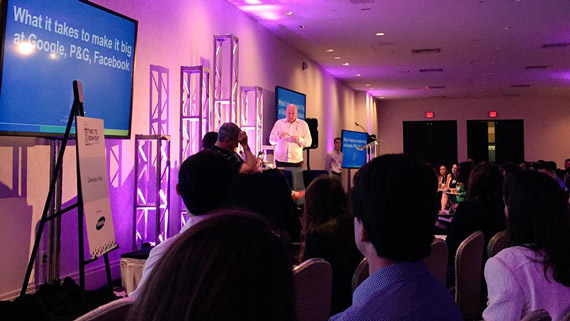Ever since I began working on iconic Procter & Gamble brands like Ariel, Cascade, Dash, Ajax, and Tide, I’ve been a big admirer of P&G’s Alumni Network. The nonprofit organization—open to any non-current P&G employee—supports and embraces company alumni while helping to promulgate the organization’s leadership values as well. Last month, the P&G Alumni Network held its seventh bi-annual global conference at the Fontainebleau Miami Beach Hotel, where Kevin Roberts, Executive Chairman of Saatchi & Saatchi, served as a keynote speaker and convener/chair of the Generation Next conference for 150 young advertising and marketing professionals.
The 600-person event boasted a speaker and panelist roster that played like a Fortune 500 who’s-who, including: Lisa Gevelber, VP Marketing for the Americas, Google; Gary Briggs, CMO Facebook; Chip Bergh, CEO Levi Strauss; Vince Hudson, VP US Marketing Samsung; Kip Knight, President H&R Block; Jim Stengel, former P&G GMO; and Kim Lopdrup, CEO of Red Lobster, among other alumni notables.
Business media loves to publish annual lists of “Great Places to Work” or “Most Innovative Companies,” but which companies have the strongest alumni networks might be the more telling and informative category ranking. Indeed, a 2010 Harvard Business Review story that looked at trading decisions of mutual fund portfolio managers from 1990 to 2006 showed how alumni networks can have profound economic implications in terms of stock holdings and returns: “U.S. mutual fund portfolio managers placed larger concentrated bets on companies to which they were connected through an education network. And the fund managers performed significantly better on those connected positions than they did on non-connected ones, to the tune of 7.8% a year.” The article goes on to make the broader point: “Alumni networks turn out to be an especially effective kind of social network” because people often self-select into organizations that have values and interests closely aligned to their own, “which generates both a higher level of interaction and longer-lived relationships.”
Why are corporate alumni networks so important? Business management guru Peter Drucker once said: “Culture eats strategy for breakfast.” One could argue that throughout its 174-year history, P&G’s greatest contribution has been its culture—its legendary training programs; the institutional wisdom the organization has passed down through generations—rather than any specific product or vertical reimagining. Last month, that spirit of excellence, relentlessness, and thriving for innovation that’s baked into P&G’s DNA could be felt everywhere across the conference rooms of the Fontainebleau. Legendary former P&G Chairman and CEO John Pepper and current P&G Group President Melanie Healey added significant gravitas to the gathering.
Corporate culture isn’t just feel-goodism, or an add-on, or a page that can be torn from an employee handbook. When it matters, and it’s true, it’s something every employee lives and breathes every day. Culture comes to be a significant strategic advantage. And alumni networks keep the cultural flame burning bright.
Millennials especially are self-selecting, and looking to work for companies that demonstrate a deep sense of purpose and exemplify core values. The importance of culture now more than ever will be what differentiates companies, helps them attract and retain top talent, and serves as the special sauce that brings in new clients. P&G know this, they live it, and they get it right. Their alumni network is a model delivery system for inculcating and pollinating culture. This last point is especially important in terms of maintaining professional relationships in a work era where lifelong employment is far from the norm.
For the real benefit of alumni networks, one would do well to consider the etymology of the word. The Latin noun alumnus is defined as “foster son” or “pupil” and is derived from the verb alere, which means to “nourish.” In terms of finding great hires; cultivating generations of brand ambassadors; driving ambition, ethics, and pride; and successfully spreading and extending corporate culture, alumni networks nourish! And in an increasingly “flat,” highly connected, and more collaborative world, that kind of nourishment is good business.

